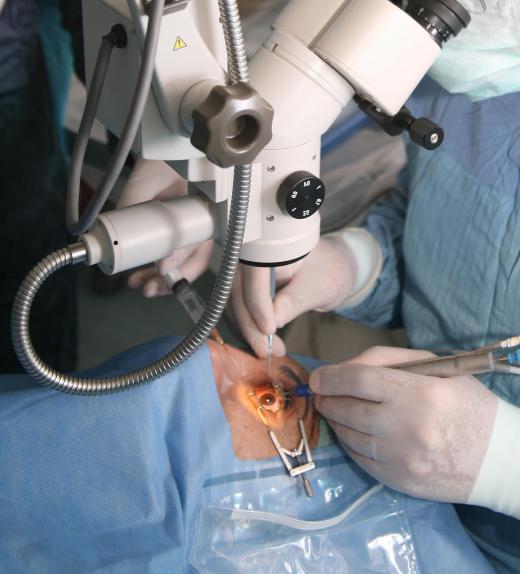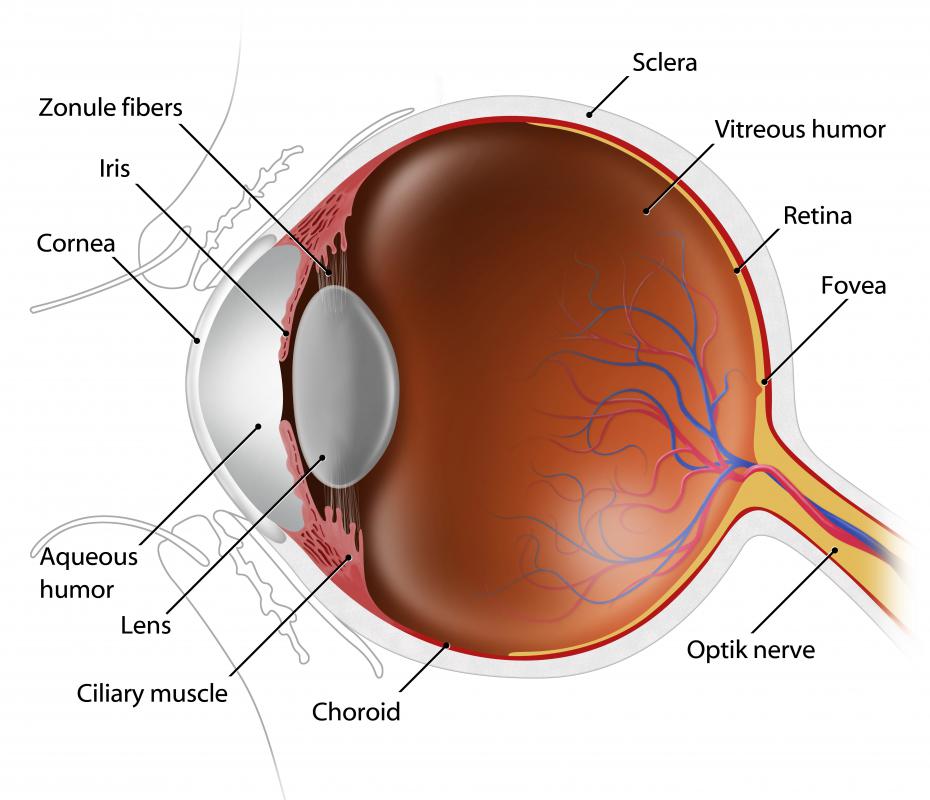At WiseGEEK, we're committed to delivering accurate, trustworthy information. Our expert-authored content is rigorously fact-checked and sourced from credible authorities. Discover how we uphold the highest standards in providing you with reliable knowledge.
What is Vitrectomy Surgery?
Vitrectomy surgery is a vision restoring operation to remove and replace the vitreous if it has become damaged by trauma, infection, or disease that would cause less light to enter the retina and impair vision. The vitreous is the clear, gelatinous material in the eye the main function of which is to hold the eye in place. The procedure may also be recommended to correct retinal detachment, repair tears to the retina itself, or to correct other non-inflammatory retinal damage known as retinopathy. Vitrectomy surgery can also be performed to correct blurred vision of the macula, the center of the light sensitive tissue of the retina; to correct breaks in the tissue, called macular holes; or to repair scar tissue, called macular pucker.
The operation begins with small incisions in the eye, through which surgeons insert microscopic surgical tools, including an internal light source, scalpels and a suction device that will cut the vitreous and remove it. The vitreous is replaced with either a saline-based solution, an intraocular gas compound, or silicone oil, which mimic the natural vitreous tissue to stabilize and maintain proper pressure in the eye. Tiny absorbable sutures are then used to close the incision points and antibiotic injections or drops may be administered to prevent infection.

Vitrectomy surgery is usually performed on an outpatient basis, although in some cases it can require a brief hospital stay of 24 hours or less. Patients require either local or general anesthesia for the two- to four-hour operation, depending on the severity of the issue. Other surgical procedures, such as laser eye therapy or retinal detachment operations, may be performed along with a vitrectomy. The post-operative recuperation period is generally between one to four weeks.

As with any operation, there are some risks associated with vitrectomy surgery, which include swelling, infection, bleeding into the vitreous, or retinal detachment. Some patients may develop cataracts or glaucoma, and may require additional surgery. Most patients, however, experience only mild discomfort due to pain, blurred vision, or eye discharge during the post-operative period.

Depending on the nature of the eye problem, the vast majority of patients who undergo vitrectomy surgery benefit from increased vision, less pain or sensitivity, and reduced pressure on the eye itself. It has become a standard procedure in the treatment of a number of ocular diseases, for injuries sustained to the retina, and for macular degeneration. Regular eye examinations by an ophthalmologist can often diagnose these issues in their early stages to allow vitrectomy surgery an optimum success rate with the lowest possible associated risks.
AS FEATURED ON:
AS FEATURED ON:














Discussion Comments
I had a vitrectomy six months ago, and my nearsightedness got significantly worse after the air bubble went away and has continued to get worse since then. I wonder if anybody out there has experienced this.
@burcidi-- I agree with @ysmina. It really depends on what the issue is. My dad had virectomy for retinopathy in both of his eyes. He had increased pressure and bleeding in his eyes because of diabetes that damaged the retinas.
The surgery in his right eye gave good results. They were able to repair the retina for the most part and his vision improved. However, the left eye didn't do so well after surgery. His doctor ended up doing two more vitrectomies on that eye to treat scar issue. But the eye just got worse and worse.
Right now, he basically sees through his right eye which has good vision. But he has lost almost all his vision in the left eye. I don't know what would have been different without the surgery. But I think he could have lost vision in both eyes, so in that sense, the surgery has definitely helped him.
@burcidi-- I think how successful a vitrectomy is depends on several factors like why you're getting the surgery in the first place and what the doctor is trying to achieve. Plus, when it comes to vision, it can take a long time (up to six months I believe) for the doctor to be able to declare the surgery a success or a failure.
Correcting retinal detachment for example, has a higher success rate than repairing scar tissue. Age and any complications that may occur during surgery are other factors that are going to affect vitrectomy surgery recovery and the final result of the surgery.
I suggest you speak with your doctor in detail about all these things before the surgery date. He might assume that you know what he's doing and might not have talked with you extensively for that reason. But it's your right to know the risks and benefits of this surgery for your specific situation.
My doctor has scheduled a vitrectomy for my left eye in several weeks. I have really bad vision in that eye and it has been getting worse lately. My doctor is acting like this is no big deal but I've never had surgery and a vitrectomy sounds scary. I don't even want to imagine my eye being cut open.
Has anyone had a vitrectomy eye surgery? Has your vision improved after the surgery? What's the success rate of this procedure? Is there a possibility of my vision becoming even worse?
If anyone can shed any light on this surgery for me before I have it, I would really appreciate it.
Post your comments